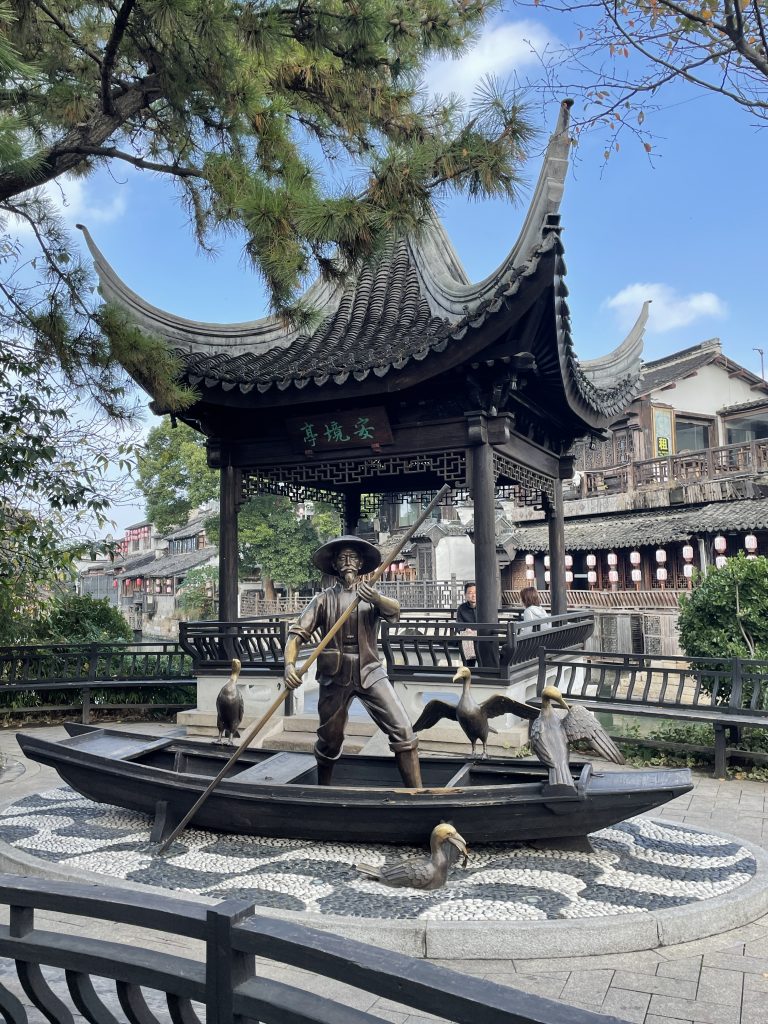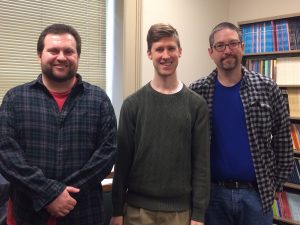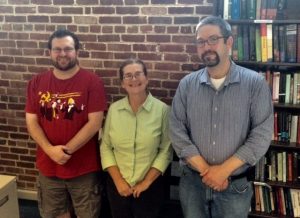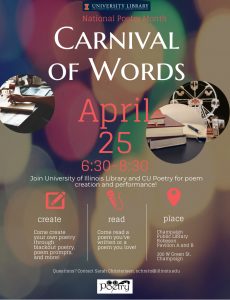Welcome to our new page: The Kindness of Ravens Our purpose is to highlight the work of Adjuncts in the English Department at UIUC. Please explore our site. Curious about the name of our site? See our blogpost: Why “The … Continue reading
Let’s Hear from Our Colleagues in China
Are you curious about the Rhet program at our sister school, Zhejiang University? Dave Morris and John Claborn sat down over Zoom to talk to our colleagues teaching in Haining, China.
ZJU Instructors Share Their Experiences

Mary went on a field trip with the Chinese Teachers’ Union to Xitang, an ancient river town.
Whatever Happened to The New Academy?
The New Academy series will mostly be on hiatus this semester as we all struggle to adjust to the instability of the moment. We’re tentatively planning on returning next semester. Thanks very much for your patience. We hope to get on track in the spring, but feel free to hit us up with ideas or to volunteer to present or help interview the talented folks of the department.
Spring 2019 Reading Series
We are finally catching up with ourselves a little bit. Last semester ended later than usual while the spring semester started a bit earlier in January. Some say the shorter break took us by surprise, but others think it was just the long, cold, lonely winter that got to us. Whatever happened, we found ourselves behind, and rather than cancel our February reading, Mary stepped in to read another story from her manuscript, Ruth Harris: Under the Prairie Moon. Though Mary is always happy to fill in the blanks, we want to hear new voices, so please consider presenting your scholarly, creative, or community work at one of our First Friday readings. Right now we have at least two presentations lined up for Fall, and are looking forward to welcoming a third. Could it be you? See our Events page for specific details and bios, but here is the rest of the spring lineup.
- Next up is Kyle Garton-Gundling who will introduce us to his new book on Friday, March 1st .
- Heather McLeer will present her work in April.

John, Kyle, and Dave in the Journals room after recording our latest podcast.
Announcing Our Fall Line-up
Hello, everyone! We’re excited to announce that the New Academy Series will continue to feature the creative and research work of Non-Tenure-Track Faculty in the English department this year. Mary and Dave are in the process of lining up speakers for our spring events, but we’re happy to announce our fall schedule right now!
On Friday October 5th in the Literatures & Languages Library (Room 200, Main Library) from 3-5 John Claborn will talk about his book, Civil Rights and The Environment in African-American Literature, 1895-1941.

John Claborn, Mary Lucille Hays, and Dave Morris.
On Friday, November 2nd in the Literatures & Languages Library (Room 200, Main Library) from 4-6 Dana Kinzy will share some of her creative work with us, including selected poems.
“The New Academy,” a reading and podcast series, offers small pictures of adjunct professional life. Given the rapidly changing shape of the profession, this series provides a small amount of information about how an important population—adjunct instructors—approach the many facets of academic life. The series intends to provoke reflection, discussion, and cooperation across the many populations served by the English department and the university community more broadly.
Please watch this space for further updates and our first podcast episode of the year, which will feature a discussion with John Claborn and be released in the week prior to the October event.
Carnival of Words
National Poetry Month Event
Carnival of Words
April 25, 6:30-8:30 in Champaign Public Library
contact Sarah Christensen for more info: schristn@illinois.edu

Building, Jamming, and the Bedrock of Communities
[Following are an edited version of the opening remarks delivered by Dave Morris at the New Academy Series event held on Friday, April 6th 2018.]
Good afternoon! I’m so glad to see you all. Thanks for coming today to hear Mary Lucille Hays read from her work. We want to thank Paula Carns and the Literatures and Languages Library for hosting our event.
Since we last met, a lot has happened! A lot has happened just this week, even. And all of it has had me thinking about what it’s like not just to be in a community, but to maintain it and make it how we want it. I’ve been thinking about how important it is on the one hand to build—to make communities, to make connections both strong and weak, to work together to create a culture that works justly for everyone. And on the other hand, how important it is to be willing to jam things up—to shut things down to force power and institutions to open, just a little, the space and institutional environment that allows building to happen.
We were proud to support the GEO strike not only because we think TAs deserve better, but because we recognized the GEO strike as an important act of jamming. That jamming was only possible, however, because of years of hard building that GEO members did. They did this building through kindness and community, but just as importantly, they did this building with a willingness to have hard conversations, to argue, to stay in the room even with anger and hurt feelings, to show up and come back even when it’s hard.
I was reminded of this earlier this week as I sat in a well-attended, contentious faculty meeting in which the tenure-stream faculty debated the important topic of restructuring the undergraduate English major. The meeting was tense; there was quite a bit of anger and frustration in the room as our professors – many of them my beloved grad school mentors – debated the proposed structure of the new major AND the procedures by which that proposed curriculum was created and will ultimately be decided. Hovering on top of those important issues and strong feelings was, in my mind, a more distracting narrative of despair: ‘this is terrible; this is so unpleasant!’
The frustration, anger, and inter-personal conflicts in the room genuinely were unpleasant and difficult to get through, and I don’t mean to dismiss the pain that many people felt (particularly those who worked so hard on trying to figure out how to restructure the major). Nonetheless, hard debates, annoying procedures, backward and forward movement, incredibly slow movement, strong feelings, even hurt feelings, are part of building. They are features, not bugs. Experienced consistently and with commitment, they provide the bedrock of communities that function – not perfectly, but steadily. They provide the foundation of communities that get to do the more joyful building, the kind where we share our work, the responsibilities and joy of our teaching, and the simple pleasure of each other’s company. Two-week strikes are what democracy looks like; hard processes in tense rooms are what democracy looks like; and conversations like the ones we have here are what democracy looks like.
We Support the GEO
Please join us in signing the GEO petition.
You can also donate to the GEO Strike Fund.
The New Academy Statement of Solidarity with the GEO
The main goal of The New Academy Series is recognizing the professional work of non-tenure-track faculty in English. The principle of recognition, however, transcends this series; it’s an underlying principle of research, of teaching, of community, and even of justice. The New Academy Series recognizes the contributions and commitments of graduate employees and believes that those commitments deserve reciprocity. We call upon the administration to affirm their commitments to graduate employees through their representative, the GEO, by renewing the side-letter tuition waiver language and raising the minimum salaries of grad employees to a living wage.
Why “A Kindness of Ravens?”
Mary Hays
So… what did you think of our new web page?
Dave Morris
I loved the picture, but I was confused by the name Kindness of Ravens.
Mary Hays
Oh yeah. Well, I just like birds, and I was thinking about crows at first, because they’re so intelligent, but maybe they get a bad rap.
and then I was thinking about crows in literature…
Dave Morris
“Murder of Crows!”
Mary Hays
Right! Only then I thought about Ravens, because Poe, of course.
Dave Morris
Yes!
Mary Hays
And I looked up to see if people call it a “murder of Ravens,” but they don’t.
Guess what they call it
Dave Morris
I bet it’s “Kindness of Ravens”?
Mary Hays
Nope. It’s actually, an UNkindness of Ravens.
Dave Morris
Wow!
Mary Hays
But I was thinking that as an adjunct, I already feel like there isn’t enough kindness around here sometimes, and I thought, let’s go against the grain and be a KINDNESS of ravens.
Because the purpose of this page is for us to support each other in our work, and there is a kindness in that.
Dave Morris
Well that makes sense!
Mary Hays
So you don’t hate it? Do you think other people will think it makes sense?
Dave Morris
I don’t hate it! It makes sense! We should ask some other people if they get it, too, to make sure it’s making sense to our general audience
Mary Hays
Sounds good.

